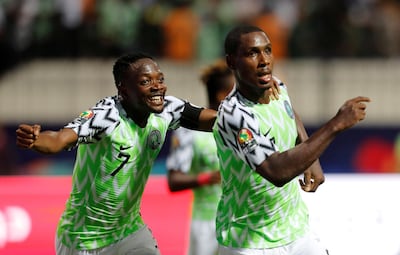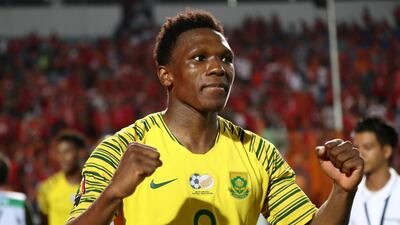In October 1992, South Africa played their first ever World Cup qualifying match. They had came late to football’s greatest show because of a decades-long ban, imposed because of the country’s then notorious system of racial segregation, apartheid. With democracy imminent, the continent seemed pleased to extend a welcome to the sporting ambassadors of a new era.
At least that’s what South Africa players felt as they arrived in Lagos to play Nigeria. They were serenaded their team bus with shouts of "Mandela", honouring the statesman whose release from prison had confirmed a brighter political future. Nigeria’s then manager, Clemens Westerhof, noted the visitors wore very flashy tracksuits.
Beneath their zip-up tops, though, hearts were beating fast. This was a journey into the unknown. Both teams were billeted in the same Lagos hotel. Sharing a lift down to the ground floor, a tall Nigerian player greeted one of his competitors - a young, diminutive striker named Bennet Masinga - by asking, with a grin, if he was a ball-boy. That Nigeria team had a lordly swagger about them. They were to be crowned African champions some 14 months later, some of them Olympic champions in 1996.
At Surelere Stadium, they duly thrashed the novice South Africans 4-0. And so began a rivalry that has remained charged. “We only scored four, out of respect for Mandela,” chanted fans as the losers left the cauldron. In South Africa, the chastened national team inherited an unwanted nickname: The "four-by-fours". This four-by-four was not a rugged, all-terrain vehicle, it was a team that kept conceding four goals, as they did against Zimbabwe and Mexico either side of their humiliation in Lagos.
So, it marked quite a renaissance when, with newly-elected president Nelson Mandela on site, wearing his replica jersey, South Africa, as hosts, won the Africa Cup of Nations in 1996. But that Afcon had a conspicuous absence. Nigeria withdrew very late on, for what were thinly-veiled political reasons, Mandela having sharply condemned the west African nation’s human rights abuses.
The cost to the Super Eagles was heavy. “That was the title we never had the chance to defend,” says Daniel Amokachi, one of Nigeria’s leading forwards of the era. “If we had been there? I can say that no other African team had the quality of players Nigeria had at the time.” They were banned, a punishment for withdrawing, from the 1998 Cup of Nations, where South Africa finished second. So, when Nigeria met South Africa in the semi-final of the 2000 edition, they did so with pent-up indignation. This was revenge, and it was efficiently, cooly served. Inspired by the electric winger Tijani Babangida, Nigeria blitzed the country who they felt had unfairly usurped them, 2-0.
A generation later, the rivalry remains sparky. It was stoked when South Africa hosted the 2013 Afcon, where Nigeria at last regained the title, settling an old score. Football battles have become the sporting expression of a wider joust. For much of the 21st century, South Africa boasted the continent’s biggest economy; Nigeria barged past it in 2014.
Neither the Super Eagles nor Bafana Bafana, who meet in Cairo on Wednesday for a place in the semi-finals of this Nations Cup, are currently at the summit of Africa's football hierarchy. Nor have either steamrollered their way to the last eight in Egypt. Nigeria lost to Madagascar in the group phase; South Africa, listed at 72nd in the Fifa rankings, eked out just three group-stage points, sneaking into the knockout phase as the lowest of the third-placed qualifiers.

But what they produced against Egypt, last Saturday, was the shock of the tournament, and, according to some South African media, the most accomplished performance by Bafana Bafana in 20 years. "The players showed a tactical masterclass" said manager Stuart Baxter, having watched them defend high up the pitch, with midfielder Bongani Zungu especially authoritative, to thwart the tournament favourites and hosts, and win with a late goal from Thembinkosi Lorch.
Nigeria, for whom captain John Obi Mikel is recovering from the knee problem that has limited his involvement, have momentum too. Defeat to Madagascar was followed by the see-saw 3-2 victory over title-holders Cameroon in the first knockout stage.
But in their rear-view mirror, some ominous landmarks. Lately, the charged rivalry with South Africa has thrown up contradictory results, notably a 2-0 away win in Nigeria during Afcon qualifying. That was an expedition expected to recall the bad old days of the rickety four-by-fours. It ended up reminding that South Africa, home of the richest league in their continent, can every so often clank into a higher gear.


